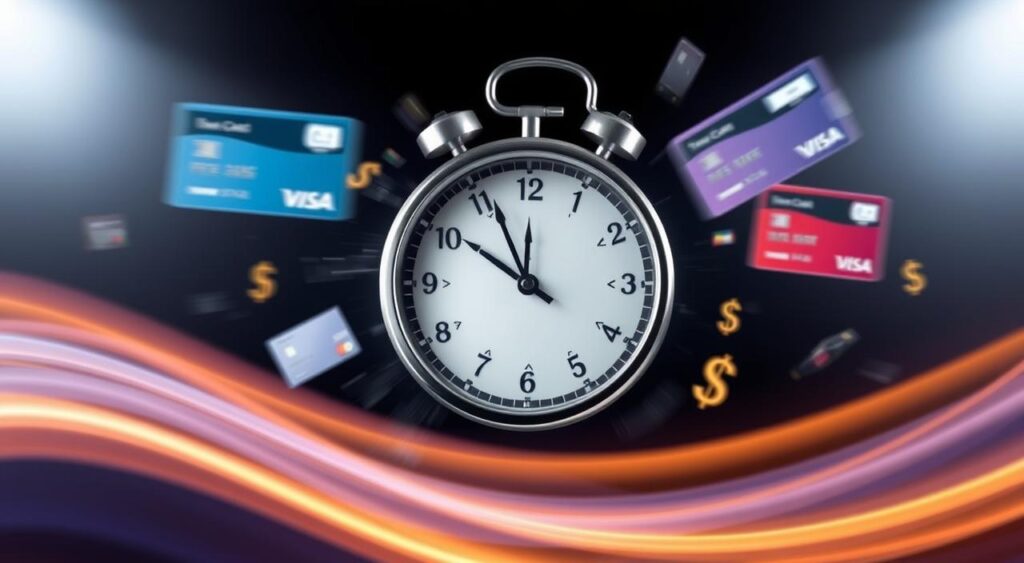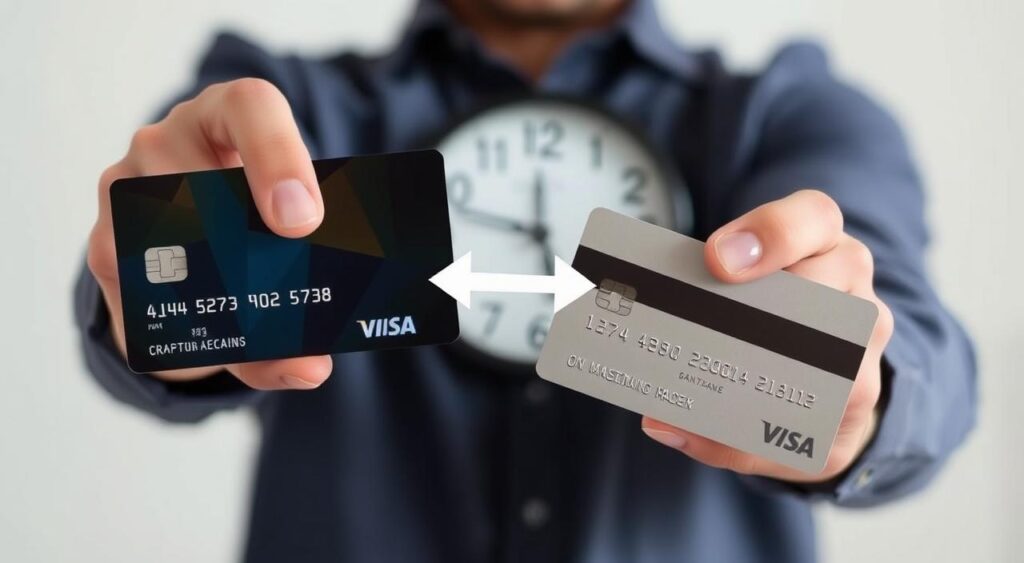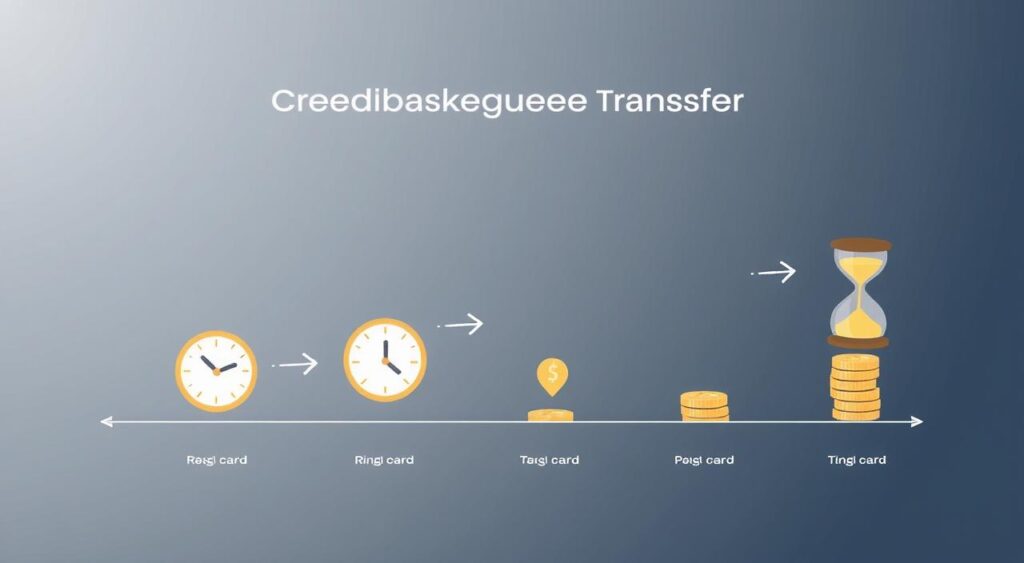How Long Does a Credit Card Balance Transfer Take?
Many people wonder how long a credit card balance transfer takes. The time it takes can change based on the credit card company and how complex the transfer is. Knowing how long it takes is key to managing your money well. Generally, it can take a few days to a few weeks to finish.

When you move your credit card balance to a new card, it’s important to know the timeframe. This helps you make smart choices about your money. The time it takes can be influenced by different things, which we’ll cover next.
Key Takeaways
- The credit card balance transfer duration can vary depending on the credit card issuer and the complexity of the transfer.
- Understanding the credit card balance transfer time frame is essential to plan your finances effectively.
- The credit card balance transfer processing time can take several days to several weeks to complete.
- Transferring your existing credit card balance to a new credit card can help you save money on interest rates.
- Knowing the credit card balance transfer processing time can help you make informed decisions about your financial situation.
- The credit card balance transfer duration is an important aspect to consider when managing your debt.
Understanding Credit Card Balance Transfers
Understanding credit card balance transfers is key. It lets you move your balance to a new card with a lower rate. This can save you money and help you pay off debt quicker. The credit card balance transfer timeline and credit card balance transfer speed differ based on the issuer and your situation.
It’s also important to know the duration of credit card balance transfer and credit card balance transfer waiting period. Some cards have a specific time to transfer your balance and get the promotional offer. Always check the new card’s terms to avoid issues.
What is a Balance Transfer?
A balance transfer moves your existing card balance to a new one. It’s a smart way to lower your interest and manage your debt.
Benefits of Balance Transfer Cards
Balance transfer cards offer many perks. They have lower rates, special offers, and help you combine your debt. Cards from Citi, Chase, and Discover are popular choices.

Initial Steps in the Transfer Process
To start a balance transfer, apply for a new card and share your balance details. The issuer will then decide if they can transfer your balance. The credit card balance transfer timeline and credit card balance transfer speed depend on the issuer and your situation.
How Long Does a Credit Card Balance Transfer Take: Timeline Breakdown
The balance transfer processing duration can vary. It usually takes 7-14 days to finish. The credit card transfer timeframe includes the application and approval process. This can take a few days to a week.
After approval, the balance transfer speed depends on the bank. Some banks can do it in 2-3 days. Others might take up to 10 days. The transfer completion timeline also includes when the amount is paid off.
Here are the typical steps involved in a credit card balance transfer period:
- Application and approval: 3-7 days
- Balance transfer processing: 2-10 days
- Payment of transferred amount: 1-30 days

It’s important to keep an eye on the transfer’s progress. Troubleshoot any issues that come up. Knowing the balance transfer processing duration and credit card transfer timeframe helps plan your finances. This way, you can make the most of the balance transfer speed.
Factors Affecting Balance Transfer Duration
When you’re thinking about moving your credit card balance, it’s key to know what can slow things down. The credit card balance transfer delay can be caused by several things. These include how fast the bank processes things, your credit score, and if your application is complete.
The time it takes for a balance transfer can be anywhere from a few days to weeks. To avoid delays, pick a credit card known for quick transfers. The size of the transfer also plays a role, with bigger amounts taking longer. Knowing how long a balance transfer will take is important for planning your money.
Here are some important things to think about when looking at balance transfers:
- Bank-specific processing times: Each bank works at its own pace, affecting how long it takes.
- Credit score: A high credit score can speed up the process, but a low one might slow it down or even stop it.
- Application completeness and accuracy: A complete and correct application can avoid delays and make the transfer smoother.
By knowing these factors and picking a card with quick transfers, you can avoid delays. The balance transfer timeframe is influenced by many things. Being aware of these can help you manage your money better.
| Factor | Impact on Balance Transfer Duration |
|---|---|
| Bank-specific processing times | Can significantly impact the overall duration |
| Credit score | A good credit score can expedite the process, while a poor credit score may lead to delays |
| Application completeness and accuracy | Ensuring accuracy and completeness can prevent delays and ensure a smooth transfer process |
Common Delays and How to Avoid Them
When you transfer a balance on a credit card, the time it takes can vary. Knowing how long it takes is key to avoid delays. It usually takes a few days to a couple of weeks, with an average of 7-10 business days.
To avoid delays, keep an eye on your transfer’s progress. Troubleshoot any issues that come up. Choosing a credit card that transfers balances quickly can also help. Delays often happen due to incomplete applications, low credit scores, or large transfer amounts. Knowing these can help you steer clear of them.
Here are some tips to avoid common delays:
- Make sure your application is complete and correct to avoid delays.
- Check your credit score before applying. A good score can speed up the process.
- Know the transfer amount and keep it within limits to avoid issues.
By following these tips, you can make your balance transfer faster and smoother. If you’re unsure or run into problems, contact your credit card issuer. They can guide you on the average time for balance transfer and help with any issues, including how many days it takes.
Remember, a successful balance transfer depends on being informed and ready. By understanding the time frame and avoiding common delays, you can make the transfer process efficient and smooth.
Conclusion: Making Your Balance Transfer Successful
The credit card balance transfer process can take different amounts of time. But, with the right steps, you can make it smooth and successful. Choose the best credit card transfer timeline and watch the balance transfer processing period closely. This way, you can save on interest and pay off your debt quicker.
Keep in mind, the balance transfer completion time depends on your credit score, the amount you’re transferring, and your bank’s policies. Stay alert, follow the advice in this article, and reach out to your bank if you run into problems. With some effort and attention, you can make your transfer credit card balance timeframe a success.
FAQ
How long does a credit card balance transfer take?
The time it takes for a balance transfer can vary. It usually takes a few days to a few weeks. This depends on the credit card issuer and how complex the transfer is.
What is a balance transfer?
A balance transfer moves your current credit card balance to a new card. This new card often has a lower interest rate or better terms.
What are the benefits of using a balance transfer card?
Using a balance transfer card can save you money on interest. It also helps you pay off your debt faster.
What are the initial steps in the balance transfer process?
First, you apply for and get approved for a new credit card with a balance transfer offer. Then, you start the process of moving your existing balance to the new card.
What factors can affect the duration of a credit card balance transfer?
Several things can influence how long a balance transfer takes. These include the bank’s processing times, your credit score, and how well you fill out the application. The amount you’re transferring also plays a role.
What are some common delays that can occur during a balance transfer, and how can they be avoided?
Delays can happen due to application issues, bank processing, or problems with the transfer amount. To avoid these, make sure your application is complete and accurate. Choose a card known for quick transfers. Keep an eye on your transfer’s progress.
